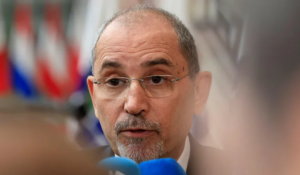Jordan’s Foreign Minister told Israelis an inconvenient truth

Jordanian Foreign Minister Ayman Safadi at a meeting in Brussels in May 2024
Yoana Gonen writes in Haaretz on 2 Octover 2024:
On Friday we heard a hopeful speech at the United Nations. Of course, it wasn’t the address by Benjamin Netanyahu, a man whose superpower is to wipe out countries and dash hopes. It was the speech by Jordanian Foreign Minister Ayman Safadi, who all but grabbed the microphone at the end of the declaration by the Arab states.
“The Israeli prime minister came here today and said that Israel is surrounded by those who want to destroy it, an enemy,” Safadi said at a press conference shortly after Netanyahu finished his speech at the UN General Assembly.
“We’re here – members of a Muslim-Arab committee, mandated by 57 Arab and Muslim countries – and I can tell you here, very unequivocally, all of us are willing to, right now, guarantee the security of Israel in the context of Israel ending the occupation and allowing for the emergence of a Palestinian state.”
Safadi wanted to remind people that Netanyahu and his government are the ones who are refusing to offer any diplomatic solution. He said that Netanyahu “is creating that danger because he simply does not want the two-state solution. And if he does not want the two-state solution, can you ask the Israeli officials: What is their endgame other than just wars and wars and wars?”
He later added: “Ask any Israeli official what is their plan for peace – you’ll get nothing, because they’re only thinking of the first step: ‘We’re gonna go destroy Gaza, inflame the West Bank, destroy Lebanon,’ and after that, they have no plan. We have a plan. We have no partner for peace in Israel.”
There’s a reason Safadi chose to echo the arrogant statement by then-Prime Minister Ehud Barak after the 2000 Camp David summit: “There is no Palestinian partner.” This expression became Israeli governments’ perpetual excuse for deepening the oppression of the Palestinian people while running away from any shadow of a chance for peace talks.
This concept became so fixed in the Israeli consciousness that it destroyed any possibility of even imagining a better future, and, in total darkness, the far right’s poisonous plants are flourishing and spreading. Later, this approach led to the concept of nurturing Hamas, “the asset,” at the expense of the Palestinian Authority – with disastrous results.
Safadi told a truth that makes many Israelis uncomfortable – one thing Israelis hate is Arabs who really want peace. Look around for a moment. This country for decades has been occupying and trampling people, is mired in an endless campaign of killing and destruction, and refuses to agree to a cease-fire even to return its own people taken hostage. Its prime minister chooses perpetual war in order to stay in power, and its citizens are adopting his insanity. Does this country look like a partner to you?
Kahanism has spread everywhere. In the schools the children sing the anti-Palestinian song “May Your Village Burn.” The government news channel celebrates death with a vulgar toast. Armed militias raid villages to beat up the people and loot their property. Israelis are thrown into detention for expressing opposition to the killing of innocents.
Cabinet members dream about nuclear bombs and settlements in Gaza and Lebanon. Gaza is in ruins and the people there are hungry. Tens of thousands of them have been killed to the sound of cheering from the Israeli masses; hundreds of thousands have become refugees. Everywhere only more destruction and hatred have been sown.
And after all that, Netanyahu still has the chutzpah to come to the United Nations and tell stories about an idealistic young country for which the only obstacle between it and world peace and unicorns is that same missing partner.
And yet, Safadi’s words offered not only reproof, but hope. They were a reminder that unlike the stories we’re told, other solutions have been on the table for years, if only we would agree to sit at that table.
In today’s Israel, anyone who dares to say this is spewed with scorn and hatred, and even the leaders of the left prefer to talk about the occupation of south Lebanon instead of peace. So it’s lucky that Jordan’s foreign minister grabbed the microphone for a moment.
This article is reproduced in its entirety
